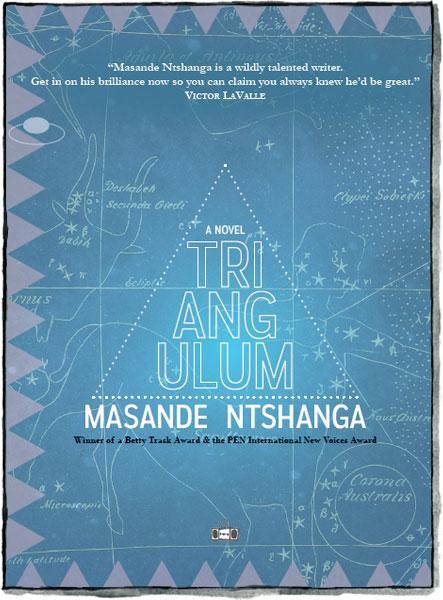
Triangulum
Triangulum is South African writer Masande Ntshanga’s second published novel and it represents an adventurous departure in genre from his first book, The Reactive (2014), a realist novel dealing with the HIV/ AIDS pandemic. What does not change in Ntshanga’s move into speculative fiction in Triangulum is his lyrical prose and focalisation through an introspective protagonist who is something of an outsider.
The novel is framed by a foreword that introduces the text to follow as a manuscript that has been delivered anonymously to the South African National Space Agency and then released to the public after three years of intensive review, a process meant to determine whether the seemingly fantastical material is a work of fiction, or fact.The year is 2043 and the primary aim of this manuscript is to serve as a warning to the world. It predicts that an asteroid will strike Earth in 2050, which will be an apocalyptic event.
The ‘manuscript’ that follows is what can be called a “future history” that projects the implications of the past and present to imagine, in this case, a dystopian future. In this way, Triangulum offers a critical commentary on how colonial and apartheid regimes of segregation have ongoing effects in the postapartheid present of Ntshanga’s writing. The story takes place across several time planes by alternating between two broad sections. One tells the story of the unnamed protagonist’s teenage years (between 1999 and 2002) in which she and her friends search for her missing mother, and whom she imagines to have been abducted by aliens. The other tells the story of the protagonist’s adult life (set between 2025 and 2035) in which she collaborates on a dystopian corporatised plan to segregate and confine poor people to slums.
With this ambitious framing, Ntshanga tells a story that is able to show how a dystopian future can be easily imagined from a dystopian past. Here, what seems like ‘the stuff of science fiction’ — regimes of societal control through technologies of oppression — can be easily found in apartheid-era forms of control like the ‘Homelands’ policy, which provided the ‘reasoning’ for forced removals of Black South Africans from what was designated ‘white territory’, and which forms the backdrop of the protagonist’s parent’s lives.
Triangulum refuses to offer a simply hopeful story where the apocalypse is avoided and a dystopian future overcome. Rather, it presents its readers with the ethical question of what to do with the knowledge of these entangled histories, when, as the novel suggests, this might help us avoid the predicted apocalypse. “Now what to do with the Future?”, the last lines of the novel ask, “the choice is ours” the Foreword proclaims.
Order the book here and support us! The work behind poco.lit. is done by us – Anna und Lucy. If you’d like to order this book and want to support us at the same time, you can do so from here and we will get a small commission – but the price you pay will be unaffected.
